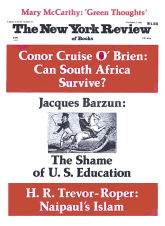In response to:
The End of Philosophy? from the March 19, 1981 issue
To the Editors:
Quentin Skinner’s fine review of Richard Rorty’s Philosophy and the Mirror of Nature [NYR, March 19] makes an error that is fundamental rather than incidental to the debate over the end of philosophy. Professor Skinner argues that the modern mind/body “…distinction was so foreign to ancient Greek philosophy that there was simply no vocabulary for expressing it….” This is not true, and if one takes it to be the case then one falls immediately into the kind of Manichean interpretation of the Western metaphysical tradition on which Heidegger rests his call for “destruction” (Professor Skinner’s milder “deconstruction”).
Heidegger and Professor Skinner can only be refuted by demonstrating that the separation of mind and body is not only a reality in ancient Greek philosophy but is also integral to it qua philosophy. Bruno Snell’s Discovery of Mind is a well-documented argument for the existence of precisely the vocabulary that Professor Skinner denies. But beyond Snell’s argument about the poetic tradition, how would Professor Skinner defend his point against the reality of the sophists in the fifth century, and what would he make of Socrates’ vocabulary in his final discussion of the immortality of the soul and the prison of the body? Plato’s Meno is surely based on an adequate vocabulary to conceive of a separation of mind and body, as is his theory of forms in the Republic. Professor Skinner’s point is indefensible from archaic to classical Greece.
The importance of this seemingly small quibble is that it reveals the “end of philosophy” question to be roughly the same kind of muddle that Professor Skinner complains about in his comments on Locke and Kant. The ancient Greeks were not quite so whole as Heidegger would have us believe, and we moderns are not quite the disembodied intellectuals that we so often fancy ourselves to be. History is not a single descending staircase from the sunlight of ancient certainty into the cave of modern relativism, and hence philosophy is not quite so determined to end as modern determinists would have us believe.
Robert R. Sullivan
John Jay College of Criminal Justice
New York City
Quentin Skinner replies:
Professor Sullivan’s criticism is an interesting one, but he ought really to direct his questions at Professor Rorty rather than at me. When I spoke of the mind/body dualism as foreign to ancient Greek philosophy, I was paraphrasing Rorty’s views, not stating my own. It is true that I did not criticize Rorty’s contention, and indeed I do not feel competent to do so. But the reason I cited Rorty’s argument was merely to illustrate a general claim he makes about the value of studying philosophy historically. Rorty points out that many philosophers have supposed that some distinction between the mind and body must be indispensable to any theory of knowledge. He then maintains that one way to disabuse ourselves of this superstition is to reflect on the fact that—so he asserts—the ancient Greeks evolved a theory of knowledge without even having a vocabulary for making such distinctions at all. Rorty’s general claim about the way in which a study of history can help us to overcome our natural tendency to invest our local concepts and categories with an excessive dignity and weight seems to me a valid and important point. Whether his specific illustration of the claim constitutes good history is a separate question, and one on which I am not myself in a good position to adjudicate.
This Issue
November 5, 1981



